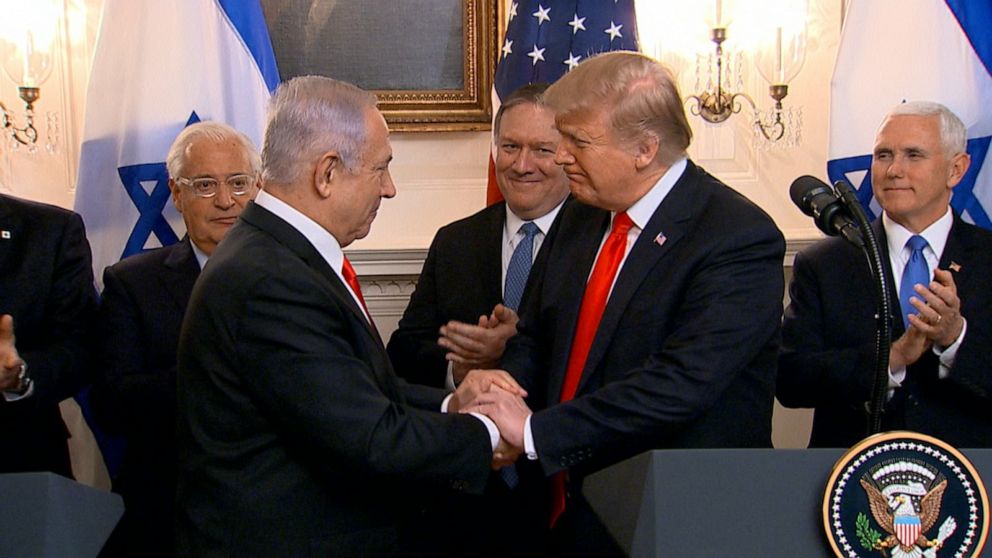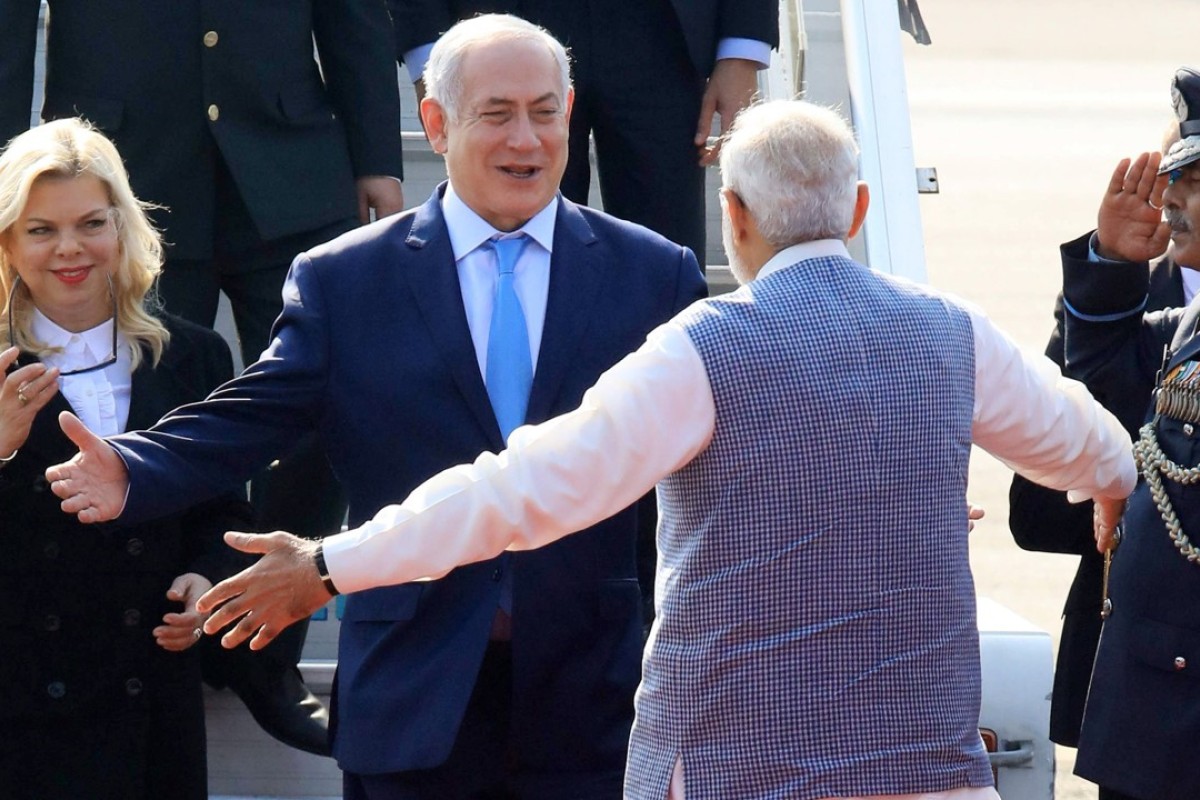
- The United States no longer thinks Israeli settlements in the West Bank violate international law.
- This recognition of the Jewish settlements is yet another indication that the two-state solution is dead.
What are the West Bank settlements?

- The West Bank, a patch of land about one and a half times the size of Goa, was captured by Jordan after the 1948 Arab-Israeli War.
- Israel snatched it back during the Six-Day War of 1967, and has occupied it ever since.
- It has built some 130 formal settlements in the West Bank, and a similar number of smaller, informal settlements have mushroomed over the last 20-25 years.
- Over 4 lakh Israeli settlers many of them religious Zionists who claim a Biblical birthright over this land — now live here, along with some 26 lakh Palestinians.
Are these Israeli settlements illegal?
- To the vast majority of the world’s nations, yes.
- The UN General Assembly, the UNSC, and the International Court of Justice have said that the West Bank settlements are violative of the Fourth Geneva Convention.
- Under the Oslo Accords of the 1990s, both Israel and the Palestinians agreed that the status of settlements would be decided by negotiations. But the negotiations process has been all but dead for several years now.
- Israel walked into East Jerusalem in 1967, and subsequently annexed it. For Israel, Jerusalem is non-negotiable.
- The Palestinians want East Jerusalem as the capital of their future state. Most of the world’s nations look at it as occupied territory.
What is Fourth Geneva Convention?
- Under the Fourth Geneva Convention (1949), an occupying power “shall not deport or transfer parts of its own civilian population into the territory it occupies”.
- Under the Rome Statute that set up the International Criminal Court in 1998, such transfers constitute war crimes, as does the “extensive destruction and appropriation of property, not justified by military necessity and carried out unlawfully and wantonly”.
American stand on Palestine

- In 1978, when Jimmy Carter was President, the State Department concluded that the Israeli settlements were “inconsistent with international law”.
- Soon after taking office in 1981, President Ronald Reagan said he did not agree — even though the establishment of new Israeli communities in Palestinian territory was indeed “unnecessarily provocative”.
- Thereafter, the United States took the line that the settlements were “illegitimate”, not “illegal”, and repeatedly blocked UN resolutions condemning Israel for them.
- In 2016, President Barack Obama broke with this policy — and the US did not veto a resolution that called for an end to Israeli settlements.
- The establishment of Israeli civilian settlements in the West Bank is not per se inconsistent with international law.
US’s present stand on Palestine
- Indeed, Trump’s recognition of the settlements means little compared to allowing Israel to build those settlements over a 52-year period.
- Likewise, the U.S. has continued to provide aid to Israel to the tune of more than $3 billion annually, as well as unflinching military and diplomatic support — including from official sanctions over the settlements at the U.N.
- The U.S. has also allowed its private citizens to give tax-free donations to charities and organizations that support the settlements.
- So, while the Trump administration has gone a step further, it is not as drastic a departure from past administrations as it would seem.
Impacts of the development
- Those who support the right of Israelis to settle in the West Bank are likely to see the decision as an endorsement.
- It will boost PM Benjamin Netanyahu, who has promised sweeping annexations in the West Bank.
- However, Pompeo did not come out as directly backing the settlers.
- The hard truth is there will never be a judicial resolution to the conflict, and arguments about who is right and wrong as a matter of international law will not bring peace.
- This is a complex political problem that can only be solved by negotiations.
Implications for Palestinians
- What does change in a significant way, however, is what the recognition of settlements means for the status of the territory and of the government that administers it.
- While the new U.S. policy does not alter the legal status of the Palestinian territories, Israel’s PM welcomed the change and said that it “reflects an historical truth — that the Jewish people are not foreign colonialists” in the West Bank.
- If it is not military occupation, which undoubtedly prohibits the type of settlement that Israel has engaged in, then it is something else that Israel must clarify its position and intentions over the territory.
- This puts the onus for fulfilling the political rights of the Palestinians back on Israel.
India’s stance on Palestine

- Sticking to its historic stance towards the Palestinian cause India was among 166 nations that endorsed Palestinian “right to self-determination”.
- According to the MEA website, India’s support for the Palestinian cause is an integral part of the nation’s foreign policy.
- In 1974, India became the first non-Arab country to recognise Palestine Liberation Organisation (PLO) as the sole and legitimate representative of the Palestinian people.
- In 1988, India became one of the first countries to recognise the Palestinian State. While, in 1996, India opened its representative office in Gaza, which was later shifted to Ramallah in 2003.
- India also co-sponsored the draft resolution on “the right of Palestinians to self-determination” during the 53rd session of the UNGA and voted in favour of it.
- It also voted in favour of UNGA Resolution in October 2003 against construction of the separation wall by Israel.
- In 2011, India voted for Palestine becoming a full member of the UNESCO.
- At the Asian African Commemorative Conference in April 2015, India supported the Bandung Declaration on Palestine. It also backed the installation of the Palestinian flag at UN’s premises in September 2015.
- PM Modi visited the West Bank in February 2018, which was the first visit by an Indian Prime Minister to the Palestinian territories.
Why does India support Palestinian cause?

- India has a considerable number of Muslim Population has been always sympathetic to the Muslim population in Palestine.
- India did not want to jeopardize the interest of its citizens (more than 7 million) working in Arab countries which are a good source of forex reserves.
- India is dependent on the Arab nations for its larger oil imports.
- India’s co-operation with the Soviet Union during cold war era and our desire to counter Pakistan with the support of Arab nations was another reason for our pro-Palestine policy.
- However, with an increased focus on closer ties with Israel, there is little doubt that India has diluted its support to Palestine.
Limitations of Cooperation
- India has so far been successful in building up its level of cooperation with Israel without endangering its relations with others.
- Nevertheless, limits to the cooperation are visible, especially in the field of security cooperation, as this remains a somewhat sensitive issue for some Arab states. However, despite its perceived fondness of Israel, India has been cautious.
- In addition, ties with Israel are an area of potential disagreement between India and the Islamic Republic of Iran.
- This often manifests in Iranian leaders’ flagging of the issue in Kashmir, a Muslim-majority state claimed by both India and Pakistan.
Conclusion
- Mutual interests run deeper than mere superficial, short-term cooperation.
- There is a growing marginalization of the Palestinian issue. And that has immensely benefited Indo-Israeli relations.
- The interest-based development of bilateral ties between Israel and India is likely to prevail and result in future cooperation, even if the Palestinian issue regains prominence.
References
https://indianexpress.com/article/explained/west-bank-what-change-in-us-policy-means-6127732/
https://www.indiatoday.in/india/story/pm-modi-amit-shah-p-chidambaram-nrc-cab-1630951-2019-12-23
https://time.com/5732752/israeli-settlements-trump-administration/
